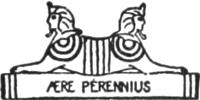WOOD AND STONE
Books by
JOHN COWPER POWYS
| The War and Culture, 1914 | $ .60 |
| Visions and Revisions, 1915 | $2.00 |
PUBLISHED BY G. ARNOLD SHAW
GRAND CENTRAL TERMINAL, NEW YORK
WOOD AND STONE
A ROMANCE
BY
JOHN COWPER POWYS

1915
G. ARNOLD SHAW
NEW YORK
COPYRIGHT, 1915
BY G. ARNOLD SHAW
COPYRIGHT IN GREAT BRITAIN
AND COLONIES
DEDICATED
WITH DEVOTED ADMIRATION
TO THE GREATEST POET AND NOVELIST
OF OUR AGE
THOMAS HARDY
PREFACE
The following narrative gathers itself roundwhat is, perhaps, one of the most absorbingand difficult problems of our age; the problemnamely of getting to the bottom of that world-oldstruggle between the “well-constituted” and the “ill-constituted,”which the writings of Nietzsche haverecently called so startlingly to our attention.
Is there such a thing at all as Nietzsche’s born andtrained aristocracy? In other words, is the secretof the universe to be reached only along the lines ofPower, Courage, and Pride? Or,—on the contrary,—isthe hidden and basic law of things, not Powerbut Sacrifice, not Pride but Love?
Granting, for the moment, that this latter alternativeis the true one, what becomes of the drasticdistinction between “well-constituted” and “ill-constituted”?
In a universe whose secret is not self-assertion, butself-abandonment, might not the “well-constituted”be regarded as the vanquished, and the “ill-constituted”as the victors? In other words, who, in sucha universe, are the “well-constituted”?
But the difficulty does not end here. Supposing werule out of our calculation both of these antipodalpossibilities,—both the universe whose inner fatalityis the striving towards Power, and the universe whoseinner fatality is the striving towards Love,—will[viii]there not be found to remain two other rationalhypotheses, either, namely, that there is no innerfatality about it at all, that the whole thing is ablind, fantastic, chance-drifting chaos; or that thetrue secret lies in some subtle and difficult reconciliation,between the will to Power and the will toLove?
The present chronicle is an attempt to give ananswer, inevitably a very tentative one, to thisformidable question; the writer, feeling that, as inall these matters, where the elusiveness of humannature plays so p